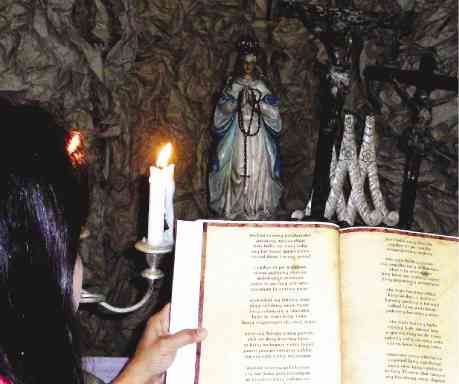‘Pasyon’ with socialist slant survives wars

SUBVERSIVE PASYON Lino Gopez Dizon’s 1936 Pasyung Malutu (Red Passion / Passion of the Workers) compares Jesus Christ with exploited workers who must unite to rise against capitalism. TONETTE OREJAS
REAL-LIFE crucifixion and flagellation are not the only unconventional Holy Week traditions in the City of San Fernando, the Pampanga capital.
There is also the clandestine singing of the “Pasyung Malutu (Red Passion or Passion of the Workers)” by surviving Huks or their sympathizers among old farmers.
Published in 1936 by Dallosa Press in Manila and banned during the Quezon administration for having lyrics that criticized capitalism, abusive landlords, corrupt officials and immoral priests, Lino Gopez Dizon’s subversive version of the traditional “pabasa” on the redemption story of Jesus Christ is now 79 years old.
The Center for Kapampangan Studies (CKS) of Holy Angel University in Angeles City held a pabasa of the “pasyon” for historical and documentary purposes last year, drawing young chanters like Aaron Rivera, Mhedy Vital and John Carlo Ronquillo.
“The pasyon is very popular. It is sung during the Lenten season. Dizon used the same form, language and tunes to make a sort of last laugh on the excesses then of the Catholic Church and government,” said Robby Tantingco, CKS executive director.
Article continues after this advertisementHuks, or members of the anti-Japanese army Hukbo ng Bayan lahan sa Hapon (Hukbalahap), sang a number of verses.
Article continues after this advertisementThe late Hukbalahap leader Luis Taruc, a comrade of Dizon in the Aguman ding Maldang Talapagobra (AMT) or Union of the Toiling Masses, wrote:
“A powerful orator and one of the greatest Pampango poets, Lino Dizon only reached the third grade in school. He was a people’s poet … . He was the author of a Passion play called ‘The Passion of the Workers.’ The barrio people were so fond of it that they preferred it to the regular Passion play, or when the regular Passion was held, Dizon’s ‘The Passion of the Workers’ was [performed] along with it.”
Dizon emerged important in the education of the masses. His capture and killing by the Japanese in May 1942 classified Dizon as a “major casualty,” Taruc said in his book “Born of the People.”
Pedro Abad Santos, the elder brother of freedom martyr Chief Justice Jose Abad Santos, organized the AMT in 1933 or a year after he founded the Socialist Party of the Philippines (SPP). Dizon was from San Fernando where the party founder lived.
Revolutionary
The Filipino’s religious passion was always revolutionary because it made up for the absence of the Bible (which the Spanish colonial government had not published nor translated in local languages in its more than 300 years of rule).
But Tantingco said the party used Dizon’s literary work—all 794 stanzas in 30 chapters—to spread the socialist ideology.
Farmers interviewed by Teresita Gimenez Maceda always referred to Dizon’s pasyon, evidence that it became part of oral tradition. She published the whole piece, accompanied by a Filipino translation, in her 1996 anthology “Mga Tinig mula sa Ibaba (Kasaysayan ng Partido Komunista ng Pilipinas at Partido Sosialista ng Pilipinas, sa Awit, 1930-1955) issued by the University of the Philippines Press.
A copy was difficult to find because, according to Maceda, anyone caught with the book was arrested. Maceda recovered her copy from a relative of Armando Baluyot, who was a friend of Dizon and publisher of the oldest Central Luzon newsweekly, The Voice, during researches conducted in 1985 and 1986.
CKS got its copy, in mimeographed and typewritten form, from the UP Library.
The opening stanza presents Christ as a socialist:
“Manibat king pungul ya pa
Mibait at meragul ya
Anga iniang camate na
Iting guinu mekilala
Talaga yang socialista.
(Since at birth and
as a grown up
Even up to his death
Our Lord was known
To be truly a Socialist).”
Dizon rejected capitalism,
exhorting:
“Uling ing kecong sistema
Sistema capitalista
Pete yu ing democracia
Ing malda mecalinguan ya
Mi-favor la ring macualta
(Because of your system
the capitalist system
You killed democracy
The masses forgotten
The rich favored).”
Praising in a verse the 1896 Filipino revolution against Spain, Dizon called for an armed uprising, saying:
“Ngening ilang panibatan
Ning danup ampon caguluan
Calulu mipacde tangan
Isaldac la ring mayaman
Itang talan cayupapan
(As the rich are the source
of hunger and chaos
We the poor must wake up
Cause the fall of the rich
Seize power).
New Christ
In Dizon’s pasyon, “workers became the new Christ who bore the cross of poverty and who needed to unite to fight capitalism,” according to a review by Gregorio V. Bituin Jr.
Ronquillo, 18, who learned how to sing the pasyon from his grandmother, said Dizon’s work revealed so much about the conditions of the 1930s.
Tantingco said, “At the height of government crackdowns on socialists before the war and on communists after the war, peasants in the countryside continued chanting the traditional pabasa but used the lyrics of the Pasion ding Talapagobra to avoid detection by the military.”
In several verses, Dizon revealed he remained faithful to the original teachings of Christ. Tonette Orejas